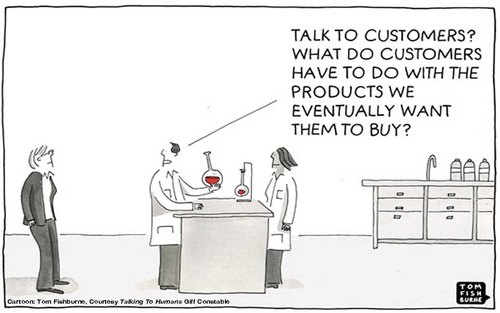TL;DR: Listen to customers, test your assumptions, follow the data, repeat

I participated in the NSF I-CORPS program quite a while ago now (LA Node, Fall 2016). The goal of the program is to assist scientists with technology transfer. It’s basically a crash course in entrepreneurship for STEM researchers. The program takes place over about 8 weeks and participants interview at least 100 people (customers, competitors, thought leaders, and partners) with the goal of finding product-market fit and determining the feasibility of commercializing the result of their NSF sponsored research project.
In my case the project I worked on resulted in a ’no-go’ decision we found that the size of the opportunity, at least for the market segments we had evaluated, was too small to pursue further. So in some regard, it was a failure - we failed to find product-market fit in a segment with a large enough opportunity. For me personally though, despite the result it was a huge success. It was process that was important. Simply writing down your assumptions and then going out and getting in front of people to try to (in)validate them was humbling and enlightening. On top of that, getting interviews with 100 people over the short time-frame of the program was no easy feat - and it involved mostly getting shutdown (or ghosted). Only about 10% of people I reached out to about interviewing responded positively. So I reached out to about 1000 people over the course of the project! Of course, attending a trade-show is a great way to hack this, if there happens to be one in the field you are interested in.
Even though the program didn’t convert me into an entrepreneur or result in a my launching a scalable start-up business with my team, it’s had a profound effect on my professional life. Even as a SWE (well I’m a bit of a jack of all trades) now, I realize that I lean on skills that I developed in the program constantly.
There were many, but I would say my key learnings are:
- Handling rejection - We just had to keep going to get to the interviews. Most people didn’t have time, or didn’t want to talk to a grad student about some project. I got used to just assuming most people were going to say no, but asking anyway.
- Checking assumptions via listening to customers - This is a big one. Post I-CORPS, when I hear assumptions made about a business decision, a new SW feature, a visit to X for Y purpose, it immediately sets of a red flag. Where did this idea come from? Has it been validated with actual customer data? If not, how can we test it?
- Presenting results - I have never liked presenting, though I’ve come to accept that it’s a simple requirement of life for me, given the types of things I like to do. I still, and probably always will, get nerves before presenting, despite having given tons of conference presentations, taught classes, and given trainings, etc. This is something that graduate students get used to, but I-CORPS, at least for me, ramped it up a bit. Often times in technical presentations, form is neglected in favor of function - eg as long as the author is sharing the information they want to share effectively, they are given a bit of slack. In my experience with I-CORPS, that didn’t fly. Emphasis was given on using the results you obtained to tell a compelling story and keep the audience engaged. I’m not always the best at that (ex: this blog), but it’s certainly improved many of my presentations.
- Talking about your business - The simple idea of a business thesis thesis of a couple sentences that answers the questions: (1) What is it? (2) Who is it for? (3) Why do they care?, IMO was powerful. I see tons of companies today that do not present a clear and concise business thesis, post I-CORPS, it flags for me immediately.
All in all - I lean on this experience all the time even as a SWE at a sonar company. If you or someone you know is considering applying to this program, I recommend it 100%. It was a one-of-kind experience and I took a lot away from it. The teachers/mentors were (and I imagine they still are) incredibly helpful, committed, and at times relentless. On top of that, they had all scaled exited (sometimes multiple) businesses, so their believability was there.